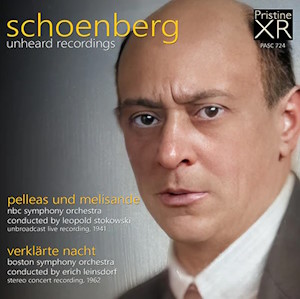
Arnold Schoenberg (1874-1951)
Unheard Recordings
Pelleas und Melisande, Op 5 (1902-1903)
Verklärte Nacht, Op 4 (for string orchestra, 1943)
NBC Symphony Orchestra/Leopold Stokowski (Pelleas)
Boston Symphony Orchestra/Erich Leinsdorf (Nacht)
rec. live, 4 November 1941, Cosmopolitan Opera House, New York (Pelleas); 24 November 1962, Symphony Hall, Boston (Nacht)
Reviewed as 24-bit FLAC download
Ambient Stereo (Pelleas)/stereo
Pristine Audio PASC724 [67]
Having just very favourably reviewed a recording on the Pentatone label of this same double bill from Rafael Payare in Montreal, I could not resist making immediate comparison with this new Pristine issue featuring two famous and favourite conductors.
My additional interest is provoked by the rarity of the recordings. I quote Andrew Rose’s programme notes: “We’ve chosen these recordings to celebrate Schoenberg’s 150th birthday not so much for their tonal musical content (though it may have contributed to their being played at the time), but rather for their incredible rarity: as far as we are aware, neither has been issued before. In the case of the Stokowski/NBC Symphony recording, it seems unlikely that anyone has heard the recording outside of the concert hall audience in 1941.”
Leinsdorf’s tempi are somewhat broader than some, but not significantly so, whereas Stokowski is distinctly brisk in his despatch of Pelleas und Melisande – indeed, by some eight minutes compared with Payare, which is a huge disparity; the terms “Sehr langsam” and “Breit” are very differently interpreted by the two conductors separated by three generations.
A note regarding a repair made to the earlier recording explains: “Alas, the opening bars to Pelleas und Melisande escaped the disc cutters and have been permanently lost – but a bit of careful editing in of a digitally-aged and -matched more recent recording has restored the missing section for this release.” The join is undetectable to me and the sound is remarkably full and vivid for so old a recording, a little hiss at the start notwithstanding – and that is soon appreciably tamed. The casual listener would never suspect that the recording is well over eighty years old – the Pristine revitalisation really is quite remarkable.
There is a certain harsh, cupped quality to the sonics but the immediacy of the sound is compelling. The score itself exhibits a very varied and striking instrumentation especially rich in the woodwind and brass and sections and as balances seem to favour them, they come through strongly, imparting an eery, spikey, unsettling ambience which Stokowski is evidently keen to emphasise, hence the urgent speeds, whereas Payare’s delivery, for example, is much more reflective and meditative. Both work; preference will be a matter of taste. Paradoxically, Stokowski’s approach makes the work sound much more avant garde and chaotic; Payare’s treatment is more redolent of the world of Gurrelieder, a piece begun contemporaneously with Pelleas. That is not to say that Stokowski does not embrace the lyricism of the music, but his lovers inhabit a hothouse akin to the passionate environment of Act II of Tristan.
The virtuosity of the New York orchestra is striking; the difficulties of the piece clearly presented them with no terrors. The finale is sweepingly, passionately played in typical Stokowski fashion, the screaming dissonances of the middle section contrasting tellingly with the grand concluding chords.
Moving to the second live, concert piece two decades later is something of a shock, as there is much more ambient, rustling noise and a bit of coughing, and the acoustic is rather reverberant – but, as ever, the ear adjusts. Leinsdorf’s way with the piece is very Karajanesque even if the sonics hardly do that justice. The velvety quality of the BSO’s lower strings emerges cleanly, however, and the more leisurely tempo does not preclude a wonderful building of tension erupting at the start of track 13. This is an “old-fashioned”, highly charged and Romanticised version – and none the worse for it; the eroticism and the emotional angst of this music are both given full weight. The “forgiveness and acceptance” theme opening track 15 is beautifully moulded and as moving as any account I know, and the solo violin is almost absurdly indulgent. The conclusion is transcendent. Applause after a decent interval is included. I thoroughly enjoy it, while conceding that more modern studio recordings offer more grateful sound.
Ralph Moore
Availability: Pristine Classical


















